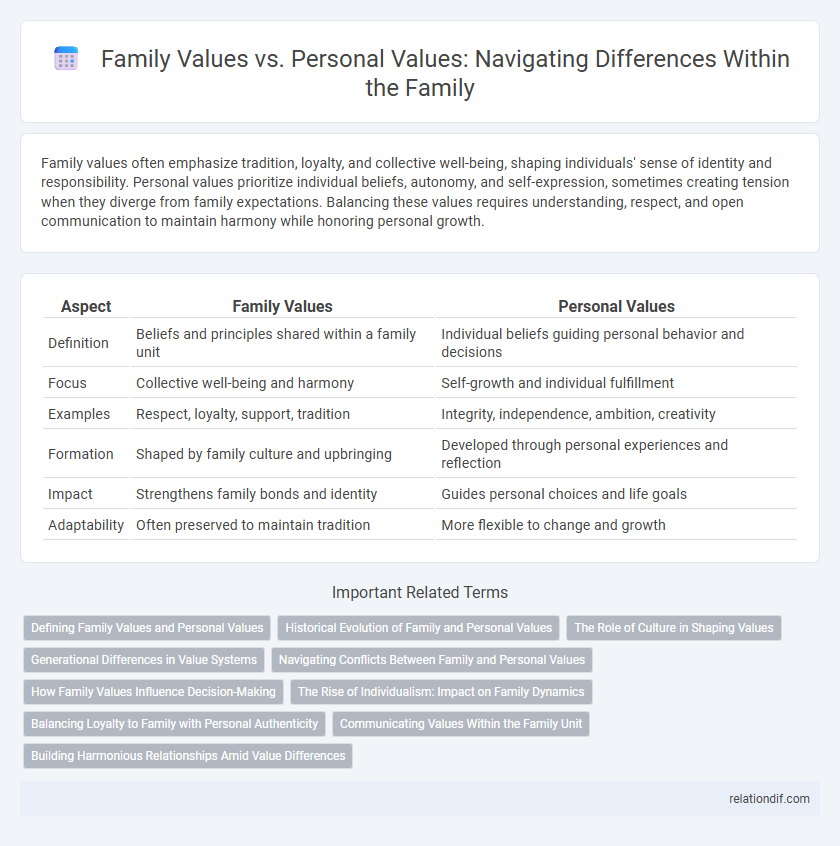Family values often emphasize tradition, loyalty, and collective well-being, shaping individuals' sense of identity and responsibility. Personal values prioritize individual beliefs, autonomy, and self-expression, sometimes creating tension when they diverge from family expectations. Balancing these values requires understanding, respect, and open communication to maintain harmony while honoring personal growth.
Table of Comparison
| Aspect | Family Values | Personal Values |
|---|---|---|
| Definition | Beliefs and principles shared within a family unit | Individual beliefs guiding personal behavior and decisions |
| Focus | Collective well-being and harmony | Self-growth and individual fulfillment |
| Examples | Respect, loyalty, support, tradition | Integrity, independence, ambition, creativity |
| Formation | Shaped by family culture and upbringing | Developed through personal experiences and reflection |
| Impact | Strengthens family bonds and identity | Guides personal choices and life goals |
| Adaptability | Often preserved to maintain tradition | More flexible to change and growth |
Defining Family Values and Personal Values
Family values are shared beliefs and principles that guide behavior within a household, encompassing respect, loyalty, and support among members. Personal values refer to an individual's core beliefs and priorities that influence decisions and actions, such as honesty, ambition, or freedom. Understanding the distinction helps balance collective harmony with personal growth and self-expression.
Historical Evolution of Family and Personal Values
Family values have historically prioritized collective responsibility, intergenerational support, and social cohesion, reflecting societal norms shaped by agrarian and industrial eras. Personal values have progressively emphasized individual autonomy, self-expression, and personal fulfillment, influenced by modernity, urbanization, and psychological theories. The evolution reveals a dynamic interplay where traditional collective ideals gradually integrate with contemporary individualistic perspectives.
The Role of Culture in Shaping Values
Culture profoundly influences the formation of both family values and personal values, as traditions, beliefs, and social norms transmitted across generations establish a collective framework. In collectivist societies, family values often prioritize harmony, loyalty, and interdependence, whereas individualistic cultures emphasize personal autonomy, self-expression, and individual goals. This cultural foundation shapes individuals' perceptions of duty, identity, and moral priorities, illustrating the dynamic interplay between societal heritage and personal beliefs.
Generational Differences in Value Systems
Generational differences in value systems often highlight a shift from collective family values, such as loyalty and shared responsibilities, to personal values emphasizing individualism and self-expression. Older generations tend to prioritize interdependence and tradition, whereas younger generations focus on autonomy and personal growth. This evolution reflects broader societal changes, affecting communication patterns and expectations within family dynamics.
Navigating Conflicts Between Family and Personal Values
Navigating conflicts between family and personal values requires clear communication and empathetic understanding to balance respect for tradition with individual beliefs. Prioritizing core family values such as loyalty and support can provide a foundation while allowing personal values like autonomy and self-expression to coexist. Establishing boundaries and engaging in open dialogue fosters mutual respect and helps resolve tensions without compromising either set of values.
How Family Values Influence Decision-Making
Family values significantly shape decision-making by providing a foundational framework of beliefs and priorities that guide individual choices. These shared principles influence critical areas such as career paths, relationship dynamics, and ethical standards, often prioritizing collective well-being over personal ambition. The alignment or conflict between family values and personal values can determine the degree of harmony in decisions and impact long-term satisfaction and social cohesion.
The Rise of Individualism: Impact on Family Dynamics
The rise of individualism has transformed family dynamics by shifting focus from collective family values to personal autonomy and self-expression. This cultural shift emphasizes individual goals, often leading to greater prioritization of personal values over traditional family obligations. As a result, family relationships adapt to balance support for independence with maintaining shared emotional bonds.
Balancing Loyalty to Family with Personal Authenticity
Balancing loyalty to family with personal authenticity requires recognizing the importance of family values such as trust, respect, and support while honoring individual beliefs and aspirations. This equilibrium fosters mutual understanding and strengthens relationships by allowing family members to express their true selves without compromising collective bonds. Prioritizing open communication and empathy helps navigate conflicts that arise from differing perspectives, ensuring both family cohesion and personal growth.
Communicating Values Within the Family Unit
Effective communication of family values within the family unit fosters mutual understanding and reinforces a shared sense of identity. Balancing personal values with collective family principles requires open dialogue and active listening, enabling each member to express individual beliefs while respecting the family framework. Consistent verbal and non-verbal communication strengthens emotional bonds and guides decision-making aligned with core family ethics.
Building Harmonious Relationships Amid Value Differences
Balancing family values and personal values requires open communication and mutual respect to foster understanding in diverse perspectives. Prioritizing empathy and compromise helps resolve conflicts, ensuring relationships remain strong despite differences in beliefs or priorities. Consistent efforts to validate each member's viewpoint create a supportive environment that promotes harmony and emotional connection within the family unit.
Family values vs Personal values Infographic

 relationdif.com
relationdif.com